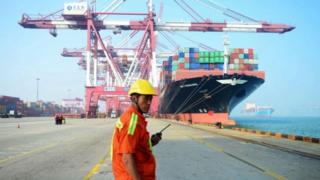Trump set to order China trade investigation
 Image copyright
Image copyright
AFP
Donald Trump is set to launch an investigation into China’s trade practices later, a move which could lead to the US imposing sanctions.
The president will sign a memorandum directing US Trade Representative Robert Lighthizer to look into China’s intellectual property practices.
US officials have accused China of stealing intellectual property from American companies.
But the China Daily newspaper said the move could “poison” China-US relations.
Mr Lighthizer will launch a section 301 investigation, which allows the president to unilaterally impose tariffs or other trade restrictions to protect US industries.
Sanctions could follow from the investigation, but there is no guarantee.
In the 1980s, tariffs were levied against Japanese motorcycles, steel and other products, but no sanctions have been imposed by the US since the World Trade Organization (WTO) was launched in 1995.
The President tweeted that he was returning to Washington DC to announce the memorandum.
Why is the Trump administration concerned?
Donald Trump has long railed against the massive US trade deficit with China.
The total trade relationship was worth $648bn (£500bn) last year, but trade was heavily skewed in China’s favour with the US amassing a $310bn deficit.
Some of that deficit, the argument goes, is because Chinese firms are copying US products and ideas and either selling them back to the US at a lower price or squeezing US imports out of the Chinese market.
How much does intellectual property infringement cost?
The Commission on the Theft of American Intellectual Property estimates that the annual cost to the US economy from counterfeit goods, pirated software, and theft of trade secrets is between $225bn and $600bn.
The commission says that China is the world’s principal intellectual property infringer, and it accounts for 87% of counterfeit items coming into the US.
The Office of the Director of National Intelligence in November 2015 put the cost of economic espionage through hacking at $400bn a year.
The European Union, Japan, Germany and Canada have all expressed concern over China’s behaviour on intellectual property theft.
Unravelling trade system
Some critics say President Trump’s action is a dangerous move that could cause the international trade system to unravel.
While intellectual property theft and copyright infringement are major problems, pursuing them with such a blunt instrument could prompt China to take retaliatory measures, according to Deborah Elms from the Asian Trade Centre.
“There will be a lot of collateral damage along the way. I understand the impulse to get tough, but if I were a company in China, I would be very worried about this,” she says.
There were hundreds of section 301 investigations in the 1970s and 1980s, but the policy tool was largely set aside after the WTO brought into effect a binding dispute system, largely at the prompting of the US.
Deborah Elms says that if the US casts aside the system it helped to develop over 30 years, other countries might be tempted to act unilaterally too.
What does China say?
Official media in China has criticised the investigation.
A Xinhua News Agency commentary labelled the move “outdated” and said it would hurt both countries.
In an editorial, the official China Daily urged the Trump administration to pursue a different path.
It said the move could not be seen in isolation from North Korea, and what President Trump sees as China’s failure to rein in the country’s nuclear ambitions and missile programme.
“Instead of advancing the United States’ interests, politicising trade will only acerbate the country’s economic woes, and poison the overall China-US relationship,” it said.

